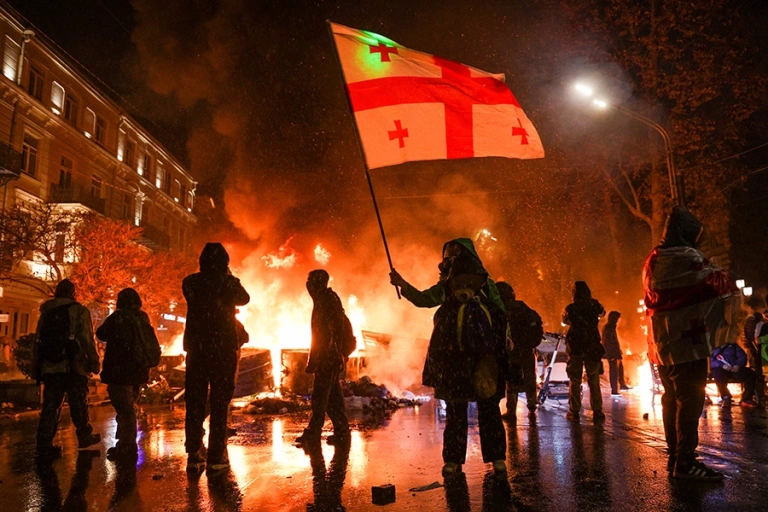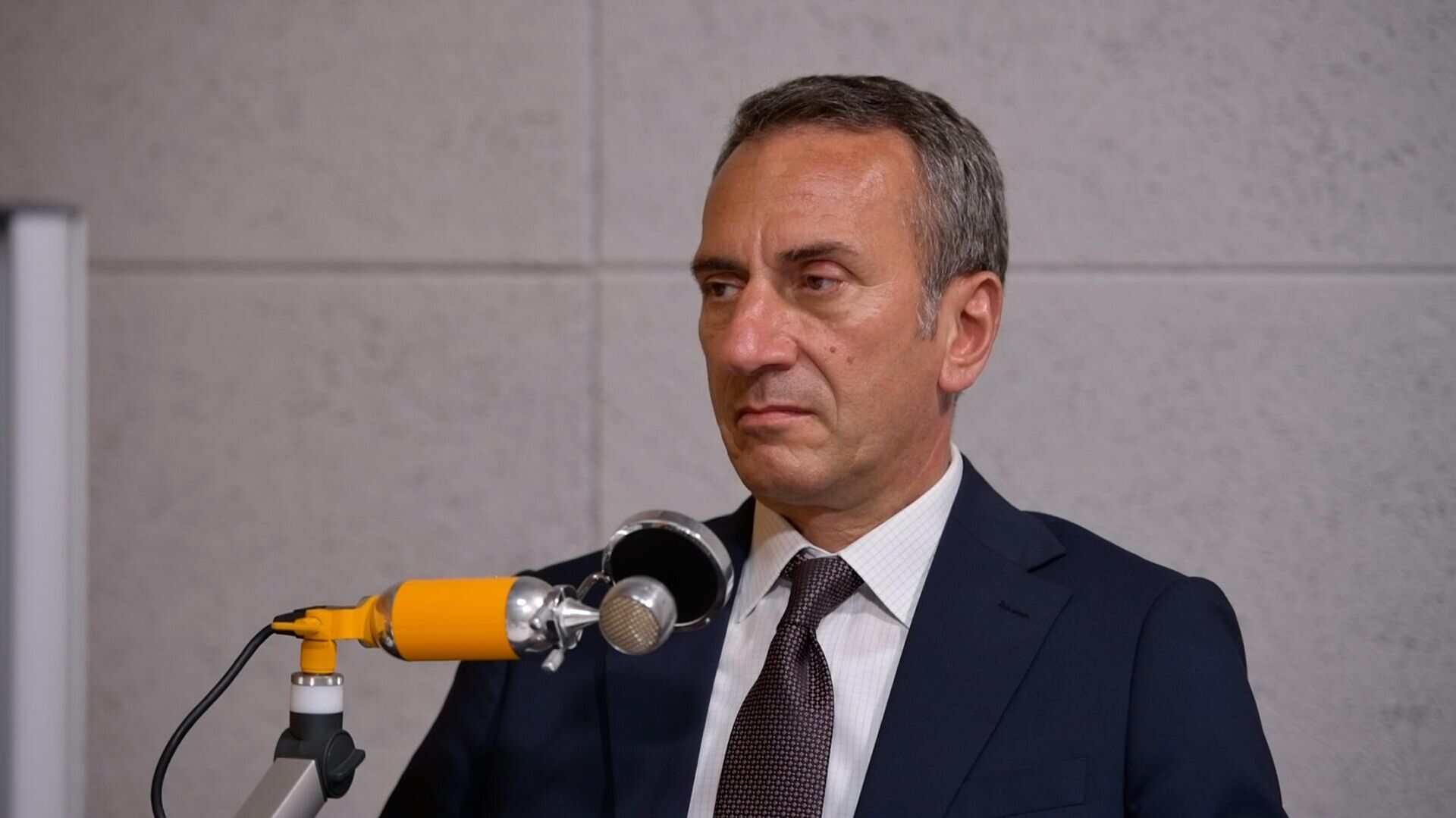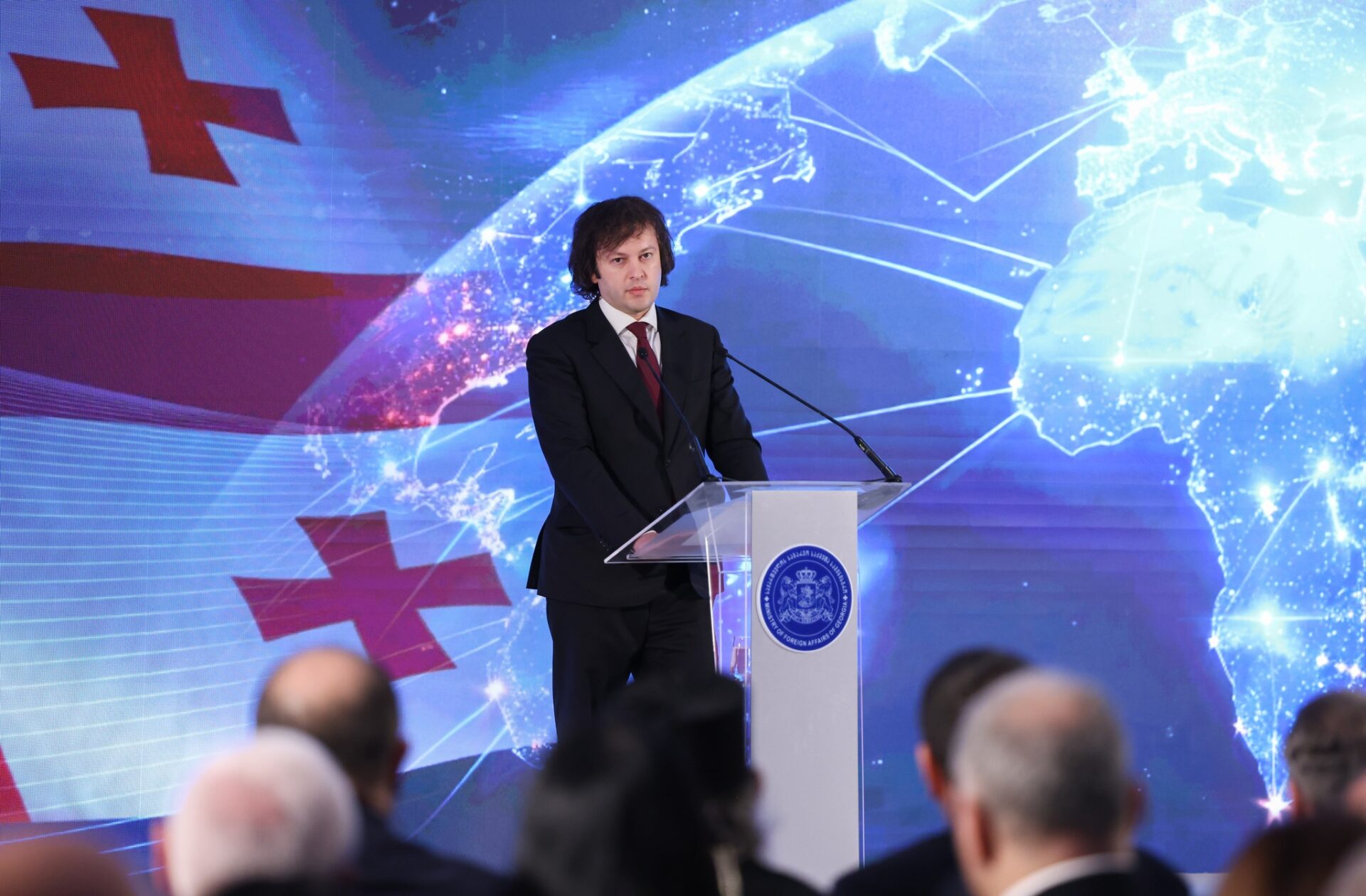
Georgians Protest Government Decision to Suspend EU Accession
Georgians Protest Government Decision to Suspend EU Accession
Executive Summary:
- On November 28, Georgian Prime Minister Irakli Kobakhidze declared that talks about Georgia’s EU ascension would be postponed until 2028, sparking protests across the country from pro-Western citizens.
- The government’s heavy-handed response to the protests—including police brutality and mass detentions—has drawn condemnation from civil society and human rights groups. These actions are exacerbating tensions and undermining democratic principles.
- Kobakhidze’s announcement reflects the rising Russian influence under the Georgian Dream party. This development undermines Georgia’s sovereignty and could also endanger the country’s turn toward the West.
On November 28, Georgian Prime Minister Irakli Kobakhidze announced the Georgian government’s decision to suspend EU ascension talks until 2028. He added that the cabinet would refuse all EU budget support, stating, “We are a proud and dignified nation with a rich history. Thus, we find it unacceptable to view our integration into the European Union as a favor to be granted.” As an explanation for this decision, Kobakhidze stated, “All of Georgia witnessed interference by some European politicians and bureaucrats in parliamentary elections, which is a gross violation of democratic electoral principles. The candidate status was used as a form of blackmail to incite chaos in our country and divide society. In the midst of the Ukraine conflict, when peace was paramount for Georgia, some European figures sought to provoke unrest using candidate status” (Radiotavisupleba, November 28). Immediately following this statement, thousands of protesters gathered near the parliament building on Rustaveli Avenue in Tbilisi. The protesters expressed outrage, stating that Georgian Dream’s decision contradicts Article 78 of the Constitution of Georgia, which guarantees the country’s European integration. Kobakhidze’s announcement indicates the rising Russian influence under the Georgian Dream party. Such development will threaten Georgia’s sovereignty and could also endanger the country’s turn toward the West.
Georgia’s Interior Ministry said that more than 230 protesters were detained on administrative charges and three arrested on criminal charges since November 28. So far, 113 police officers need medical attention, while three others were hospitalized after clashes with protesters who hurled fireworks at police. The Civil Society Foundation (formerly Open Society-Georgia Foundation) has condemned the violence and human rights violations committed by the police against peaceful demonstrators. Its statement describes a range of abuses, including the beating of protesters after arrest. Additionally, there has been an excessive mobilization of police forces and attempts to provoke violence from the demonstrators. The Civil Society Foundation notes that an unprecedented number of police officers were deployed to suppress demonstrations, with a strong presence from the Special Tasks Department under the controversial command of Zviad Kharazishvili, a figure sanctioned by the United States.
These protests are unique to Georgia because political parties or non-governmental organizations (NGOs) have not coordinated them. The protesters are self-organizing through social networks (JAM-News, December 2). As Nika Gvaramia, founder and leader of the “Coalition for Change,” stated in his December 1 interview with this author, the demonstrations in Tbilisi, as well as in several Georgian towns, especially in the self-organization of society, show the final refusal of the Georgian people to return to “Moscow orbit.” He explained, “The Soviet Union will never be restored in our country. We are a European civilization and will be in Europe.” According to Gvaramia, the West’s reaction to Georgian Dream’s actions “will be increasingly harsh.”
This was demonstrated on December 1 when Washington suspended the historic US-Georgia Charter of Strategic Partnership, which was signed in 2009 by then-State Secretary Condoleezza Rice and Georgian foreign minister Grigori Vashadze. Matthew Miller, US Department of State Spokesperson, said that Georgian Dream’s various anti-democratic actions had violated the core tenets of the US-Georgia Strategic Partnership, which was based on shared values and commitments to democracy, rule of law, civil society, respect for human rights and fundamental freedoms, and anti-corruption efforts (1tv.ge, December 1).
Numerous Georgian diplomats have rejected the country’s turn away from its 33-year foreign policy trajectory toward the West. Georgia’s Ambassadors to Lithuania, Bulgaria, the Netherlands, the United States, and Bulgaria and the acting Ambassador to Italy have all tendered their resignations since the beginning of the protests (Civil.ge, November 29, 30 [1], [2], December 1, 5).
David Berdzenishvili, the founder of Georgia’s Republican Party in 1979, is sure that these resignations and statements from hundreds of Ministry of Justice and Ministry of Defense servicemen “are the final bell for Georgian Dream.” He stated, “A regime change in Georgia is going to occur in only a matter of time, maybe a few weeks or months, but much will depend on the firm position of the United States and European Union.” Berdzenishvili recalled the Ukrainian Maidan in 2013 when then-President Viktor Yanukovych refused to sign the agreement with the European Union, which led to an uprising in Kyiv. During the protests, the president was forced to flee. Berdzenishvili observed, “Yanukovych also did not expect a sharp reaction from society. But that was a tragic mistake and miscalculation. The Georgian government has now made the same mistake” (Author’s interview, December 2).
Not all Georgian experts are confident that a regime change in Georgia will be peaceful. Former Member of Parliament David Zurabishvili stipulated, “Perhaps this process will be peaceful, but it also may not be peaceful. It depends only on the government. It’s up to them—will they be able to adequately assess the situation and the depth of the crisis in which both they and the country have found themselves or not” (Author’s interview, December 2).
As of now, the confrontation is only intensifying. On December 4, law enforcement officers arrested Ahali party leader Nika Gvaramia and several other oppositionists. (Civil.ge, December 4). Georgia’s Interior Ministry said that more than 290 protesters have been detained on administrative charges and 17 arrested on criminal charges since November 28. These arrests do not indicate that Georgian Dream is willing to seek a compromise. Kobakhidzhe’s December 5 accusation that pro-EU factions were attempting a failed revolution and his vow to suppress Georgia’s “liberal-fascist” opposition indicates that Georgian Dream will not back down from its current position (Agenda.ge, December 5). The unrest underscores the growing divide between Georgian citizens’ pro-Western aspirations and the ruling party’s authoritarian trajectory, threatening the country’s stability and ties with the West.


